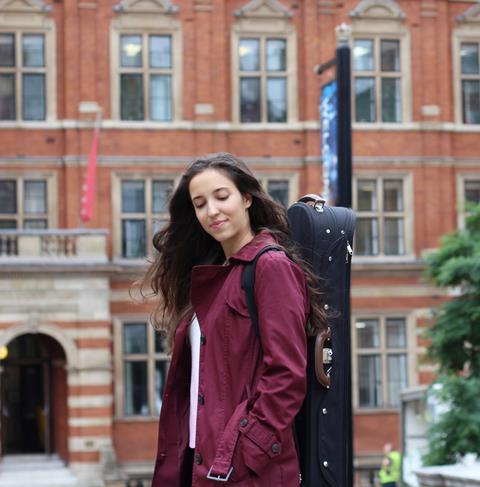Rebeca Nuez Suarez aims to show how performance and academic research inform each other in her PhD research

Read more student and player experiences in our Education Hub
Interrogation is the daily companion of a working musician.
In the practice room, we find ourselves embroiled in an open and constant self-driven discussion as part of our ongoing quest to learn and to improve. Effective practice needs to be deliberate, reflective and in many ways inventive as we try to discover what works and what does not work.
This process shapes practice itself into a research enterprise, turning the very experience of being and existing as a musician into a kind of lifelong research project. Outside the practice room, beyond the technical and the musical, this habit of interrogation and experimentation is reflected as well within the processes through which 21st-century musicians identify and gain the broad and evolving set of skills and knowledge that is now required to develop and sustain careers as cultural practitioners.
With such context, it would appear only natural for musicians to consider the potential value of their experiences in shaping models of research that become meaningful contributions to existing knowledge in the area of music research.
My interest in artistic research has gradually increased through my undergraduate and postgraduate conservatory study. The investigative nature of music making and performing has long fascinated me, and I knew early on that I would at some point want to explore the possibility to merge my performance activity with a more formal way of enquiry. This interest in research ended up morphing into the PhD project that I am currently undertaking at the University of Leeds, which has given me the invaluable opportunity to look at my practice through an entirely different lens. In turning creative practice into the object of study, my research comes to be driven by questions emerging from my own musical practices, generating a symbiotic relationship where enquiry and practice progressively inform each other until becoming one.
Whatever shape it may take, whatever area of practice to be explored, it is a route I would wholeheartedly encourage all musicians to consider, as the exhaustive documentation and sincere questioning of our practices and processes are key in determining the extent to which current professional practice is reflected within existing classical music research, education and training.
The academic community could surely benefit from embracing a larger and more plural collection of perspectives, and closer collaboration among performance and practice researchers within different subspecialties would constitute a promising route towards a deeper understanding of music performance practice and creative expression in all their complexity.
The field of artistic research offers musicians a chance to further cultivate the sense of curiosity inherent to their practice in a way that is as personal and emotional as it is analytical, and within a setting that prompts them to be rigorous and thorough while remaining flexible and creative.
Performing research can inspire musicians to expand their own awareness of their practice, but it also allows musicians to expand the creative possibilities of the research process itself, challenging our perception of music making, illuminating cultural and artistic practices that may be under or even unrepresented in academia, and facilitating the generation of an open and inclusive discussion within our music community at large.
Rebeca is currently pursuing a PhD exploring her own creative practices and performance activity, in response to the need for young classical artists to find creative ways to engage new audiences in the modern digital world. Watch her latest release of Bach’s Chaconne here, which will be available on streaming platforms from 9 December:



































No comments yet